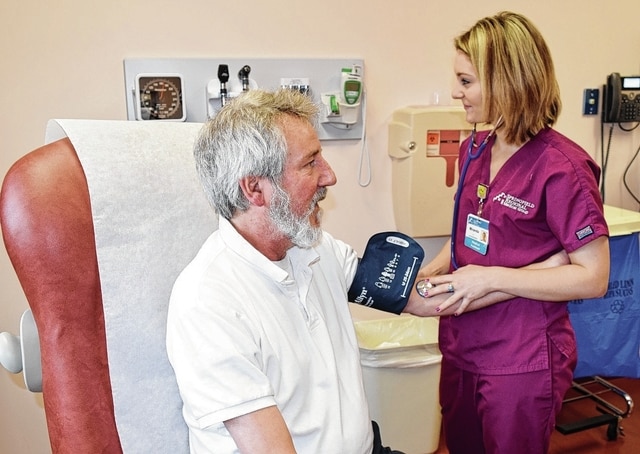
The Affordable Care Act has increased insured patients across the state, alongside the Medicaid expansion in Ohio, and that affects the bottom line of area hospitals.
With President Donald Trump and Congress taking aim at the health law, also known as Obamacare, health law experts and hospital administrators are considering how its potential repeal may impact operations and patients.
A repeal may affect the number of insured individuals, the quality of care and the financial health of hospitals, Ohio State University Associate Professor of Law and Public Health Efthimios Parasidis said.
“Many hospitals, in response to the provisions in Obamacare, instituted programs to research improving quality and decreasing costs,” he said. “If the law is repealed, it will impact the investments hospitals put into creating those programs.”
Parasidis said it takes time for investments in quality of care to show they are working, and the law has not been in effect long enough to see those improvements.
Another impact could be coordinating care between hospitals in provider networks. The health care law encouraged this practice, to improve accountability in care. Parasidis said high costs come from doctors and health care providers not talking to each other about patient care.
“Hospitals and provider networks have spent a lot of money on accountable care. If that gets erased, all that investment will be wasted,” he said.
Impact on the newly-insured
The biggest impact will be to those who were newly insured through the health law, whether by having access to care on health exchanges or through expanded Medicaid access. Ohio is one of the states that expanded Medicaid for its residents.
“I think this could be extremely detrimental to the citizens of Ohio who would lose health care,” Parasidis said.
Locally, Mercy Memorial Hospital and Springfield Regional Medical Center have seen increased usage following the passage of the health care act, largely due to the Medicaid expansion in Ohio, Community Mercy Health Partners President and CEO Matt Caldwell said. At the end of 2016, 22.9 percent of CMHP’s facilities served Medicaid patients; and 49.66 percent of the hospital system’s patients are Medicare patients, he said.
Though he did not have specific financial impact numbers, any repeal of the law would impact a large portion of the provider’s patients, Caldwell said. One of the important aspects of the health law is providing preventive care, which can have a financial impact down the road if easily-fixable problems are allowed to become more serious ones.
“People who have access to regular medical care can benefit by catching health issues early before they become more serious, more complicated and much more costly to treat,” Caldwell said. “Preventive care and early detection and treatment of chronic conditions improves quality of life and can provide significant savings over the long term, both for the patient and our community.”
An increase in the number of insured patients has also been noted at Memorial Hospital in Marysville, said Memorial Health Executive Vice President Spence Fisher.
Mary Rutan Hospital President and CEO Mandy Goble is another that has seen an increase in insured patients from a variety of sources through the health care act. That has had a major effect on the bottom line.
“Since 2013, we have seen uncompensated care costs decrease from $5.2 million to around $500,000 last year,” she said. Goble added 7.4 percent of patient billings in 2013 were no-insurance (or self-pay) patients, which decreased to 2.6 percent in 2016.
Mary Rutan had an increase of Medicaid-insured patients from 16 percent to 22 percent in the same time period.
“Probably for us, the biggest impact has been through the Medicaid expansion, which would be typical for rural communities,” Goble said. Mary Rutan is an independent hospital in Bellefontaine designated as a rural hospital.
If no replacement for ACA?
The biggest concern of a repeal of the law without a replacement is the return to a larger uninsured population and reduced funding to hospitals for care from the government. Goble said hospitals have funded some of the costs of the health care act through a reduction in reimbursements for treating Medicare patients.
The law also brought financial penalties for high readmission rates and other quality-of-care items.
Goble said she fears a repeal without a replacement will increase the uninsured number of patients again and keep the reduced reimbursement payments.
“We are much more in favor of repeal and replacement than repeal only,” she said. “We want to protect the 21 million newly-insured people through the Affordable Care Act. It doesn’t have to be the same system it is today.”
Goble added that there are regulations in the new health care law that have been burdensome, and she would like to see that reduced, but that does not mean she supports a complete repeal.
Since it is unknown what could replace the health care law, it is difficult to determine the impact to health care providers, officials say.
“It’s too soon to know how this Congress’ decisions and the direction of the new White House administration may impact the Affordable Care Act in full or in part,” Caldwell said, echoing other hospital officials’ take on the future. “Whatever happens, providing access to low cost, high quality care was and will continue to be the important thing to our patients.”


